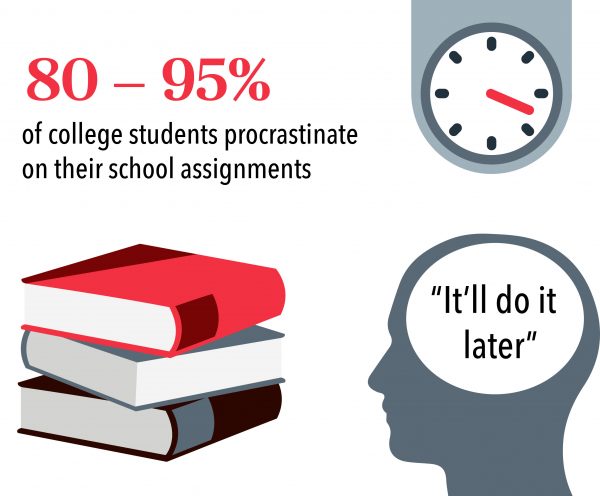
Data from the American American Psychological Association. Lilly Kujawski | Washtenaw Voice
By Lilly Kujawski
Editor
If you ever (or often) find yourself scrambling to finish an essay the night before it’s due or cramming for a test in the final few hours before you take it, you’re not alone. Most people are guilty of putting off work from time to time, but when chronic procrastination becomes a way of life it can be hard to overcome.
While psychologists, teachers and academic organizations alike will tell you that chronic procrastination can only result in negative consequences, students know these habits are difficult to break.
Instead of asking students to drastically change their study behaviors overnight—a daunting and usually unrealistic expectation—the following advice is meant to meet procrastinating students where they are. Here are study tips from some self-proclaimed procrastinators at WCC to help you take baby steps in the right direction and make those procrastination tendencies work for you (instead of against you):
Start assignments immediately
If you’re prone to procrastination, this may sound impossible, but Daija Miller, 18, an early childhood education major, said that starting an assignment as soon as you get your hands on it can help you later. You’ll overcome the first great obstacle—getting started; and even if you procrastinate later, it will help to have that preliminary work done so you know what the assignment entails and which direction you plan to go in, she said.
Similarly, Kinikachi Wejinya, 22, an engineering major, suggested looking over notes right after class so you can become familiar with the material straight away.
“Right after class I try to look over the material and at least try to understand a little bit of it, so when it comes to the day before a test, I don’t feel overwhelmed and have to go back and relearn everything,” Wejinya said.
Schedule blocks of time for schoolwork
This strategy works especially well if you have a busy schedule or work a lot, said Peter Murray, 29, a computer science major. He suggested designating a whole day out of the week to work on school assignments, while keeping your spirits up with study breaks.
“I have to dedicate a day off to where it’s just going to be schoolwork, and it might not sound good to have a whole day where you’re just doing nothing but books, but I also break it up,” said Murray. “I finish with one subject, then I’m going to watch an hour of TV or play games, then I’ll go back to studying.” Murray said that this routine helps him because “…otherwise, I’ll get distracted really easily.”
Work toward a goal or reward
Bobby Kahn, a 17-year-old WTMC student, said it’s helpful to get an assignment done if he knows he has something fun to look forward to afterwards, such as plans with friends or a video game.
Complete one assignment at a time
Augustine Benjamin, 25, a mathematics major, used to procrastinate a lot, until he tried a technique that worked for him.
“I literally don’t do anything else other than homework until I have no homework,” Benjamin said. “I add things to my list of homework and I just continue to do homework until all the homework is done.”
Common advice for writing essays is to break up the work and write a few chunks each day, he said. While this technique may help some people, Benjamin said it doesn’t work for him because he tends to lose momentum.
“If I try to do a little bit each day, I will do the first three little bits and then I will do none of the rest of it,” Benjamin said. “So, instead, I devote like, a 12-hour block to just doing the whole paper.”
Focusing on one assignment at a time and devoting a significant block of time to completing it before moving onto the next project is how he is able to get homework done, Benjamin said.
“I think this strategy works well if it’s easy for you to work on one thing for a long time,” Benjamin said.
Designate “okay to procrastinate” time
If procrastination is your M.O. and you know it, schedule time throughout the week where you allow yourself to push work to the side and put things off, said Aaron Brzozowski, 31, an engineering major. That way, your desire to procrastinate is satisfied, and you still get your work done during actual study sessions.
Create a high-energy study playlist, then set your phone to “do not disturb”
“Pick a playlist of songs and stick to that playlist—and don’t touch your phone,” Wejinya said.
Put it off—but not to the last minute
If you know you’re going to procrastinate on an assignment, at least do so within an earlier, self-imposed deadline, so if something goes awry, you still have a few buffer days before the assignment is actually due for class, Kahn said.
“Never leave it to the ‘last, last’ day,” Kahn said.
Murray shared similar advice when it comes to writing essays for school.
“It’s never good to try to write an essay before your class,” Murray said. “If I’m going to procrastinate and I know I’m going to procrastinate, I try to write at least a paragraph or a page a night when I get home, because it’s like procrastinating but with progress.”
Advice from the writer: Manage time and plan ahead
Whether you’re completing the assignment two weeks or one night before it’s due, be sure to have enough time set aside to finish it, with time left to check your work. Make certain you understand all the requirements ahead of time so there are no surprises at the end. Anticipate any unexpected conflicts that may arise, such as a printing issue, unforeseen homework assignments in another class or being scheduled last-minute for a shift at work.
| Want to kick the habit for good? |
|


